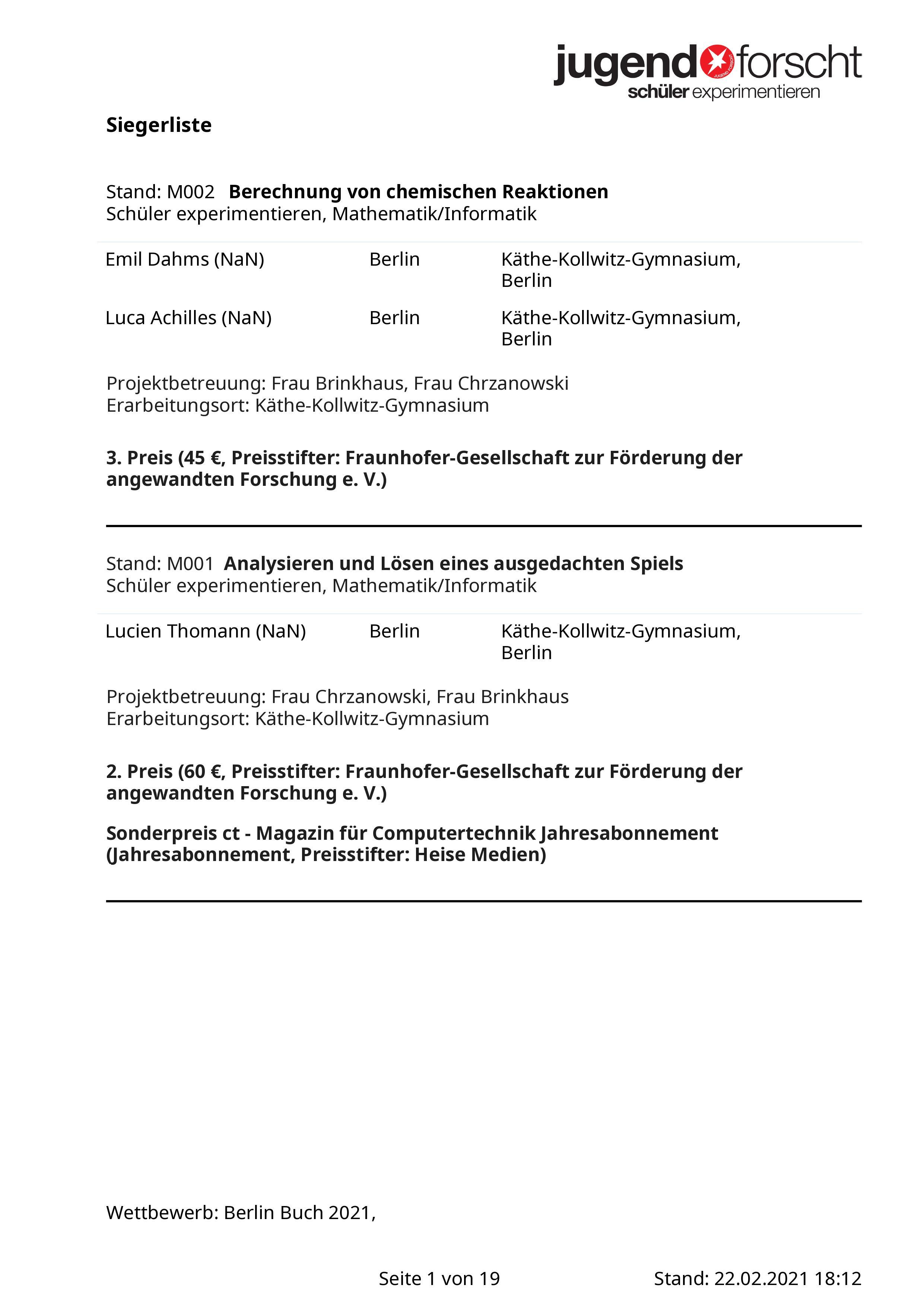Ideas for the future in the Jugend forscht contest
This pandemic is an extraordinary time for all of us, including those entering the Jugend forscht contest. Young STEM enthusiasts and the experts who mentored them needed to be very flexible and find creative ways to make the ideas behind the projects a reality. Despite the obstacles, the number of entrants throughout Germany only dropped by a quarter in comparison to the previous year, with around 9,000 young researchers entering the 2021 contest. For the first time, Campus Berlin-Buch was one of the three locations hosting the regional contest in Berlin. It supervised a total of 39 projects.
On 16 February 2021, the schoolchildren presented their research at the digital contest in Berlin’s Buch neighbourhood. The slogan of the event was “Leave a future for the next generation”. Three mentoring institutions helped to organise the contest: the Max Delbrück Center for Molecular Medicine in the Helmholtz Association (MDC), the Leibniz-Forschungsinstitut für Molekulare Pharmakologie (FMP) and Campus Berlin-Buch GmbH. The Experimental and Clinical Research Center (ECRC) run by the MDC and the Charité – Universitätsmedizin Berlin was also an associate sponsor.
Special award: a day in the lab
At the award ceremony on 23 February 2021, two projects in each of the seven categories were awarded first prize – one from Jugend forscht and one in the junior segment of the contest, Schüler experimentieren. On top of this, there was an additional winning project in the technology category, while an outstanding physics project won the award for best interdisciplinary project. All in all, 16 projects are moving on to the next stage of the contest. The winners will be eligible to enter the state contest at the Technical University of Berlin. In addition to first to third place, numerous special awards were also handed out, for example the special award for resource conservation awarded by the Education for Resource Conservation and Resource Efficiency network for a project that aimed to recover neodymium, a rare-earth element, from old magnets.
In the biology, physics, work environment and mathematics/IT categories, five young researchers also qualified for the Campus special award: a day in the lab, which will provide the enthusiastic scientists of tomorrow with insights into the research conducted at the respective institutes.
The FMP, for example, chose two 14-year-old pupils from the Käthe Kollwitz School, Emil Dahms and Luca Achilles, who wrote their own program for calculating chemical reactions. Professor Volker Haucke, Director of the FMP, gave their efforts a special mention before the announcement: “At this age, being able to write a program that is given an incomplete chemical reaction as an input, works out all the missing raw materials and products and then balances the equation is truly remarkable.”
Peter Armin Jung, who is currently doing his Abitur (the German equivalent of A-levels) at the Katholische Oberschule Salvator, received a Campus prize from the MDC. He demonstrated why kefir grains are suitable as effective probiotics for boosting the immune system and examined the best way to mass-produce them for consumption. "I'm very impressed by the dedication of the young people, but even more so by the quality of their work. I was particularly happy to see the professional set-up of the experiment with the kefir grains, not to mention how relevant it is to everyday life. I would like to congratulate Peter Armin Jung on his well-deserved special award,” said Professor Heike Grassmann, Administrative Director of the MDC, during the award ceremony.
Professor Heike Grassmann, Administrative Director of the Max Delbrück Center, presents a Campus special award to Peter Armin Jung from the Katholische Oberschule Salvator.
Eco-friendly mobility and radiation protection
Professor Friedemann Paul, Director of the ECRC, congratulated Marvin Ramm, aged 17, from the Archenhold School on his remarkable work: “Marvin Ramm has constructed his own Geiger counter, developed a PCB and the necessary software for it and made a case using a 3D printer. His prototype enabled him to more closely examine the shielding or attenuation of ionising radiation. But his ultimate goal is to develop a low-cost device for use in schools.”
In the work environment category, Leonardo Kluge, aged 13, a pupil at the Robert Havemann School, received a special award for his work experimenting with a smart road. He developed a road model that aims to supply electric cars with electricity sustainably through induction. Dr Ulrich Scheller, Managing Director of mentoring company Campus Berlin-Buch GmbH, said: “Eco-friendly mobility is a major concern for Campus and the future of the entire Buch neighbourhood, and we are actively exploring this issue. We are excited to be welcoming Leonardo Kluge to Campus for a day.”
Campus would be delighted to support another Jugend forscht contest next year. “We simply loved the variety of ideas, the meticulous way in which the projects were carried out and the enthusiasm of the talented young individuals,” explained Dr Scheller. “After everything had to go digital this year, we are hoping that the contest can take place in person next February. After all, despite modern technology, this vital discussion of ideas is still best done face to face.”
Text: Christine Minkewitz, Campus Buch
Joint press release of the Campus Berlin-Buch, MDC and FMP
Further information
Photo
Professor Heike Grassmann, Administrative Director of the Max Delbrück Center, presents a Campus special award to Peter Armin Jung from the Katholische Oberschule Salvator. Photo: Felix Petermann, MDC
Contacts
Annett Krause
Public Relations
Campus Berlin-Buch
Tel.: +49-(0)30-9489-2920
a.krause@campusberlinbuch.de
Jana Schlütter
Editor, Communications Department
Max Delbrück Center for Molecular Medicine in the Helmholtz Association (MDC)
Tel.: +49-(0)30-9406-2121
jana.schluetter@mdc-berlin.de or presse@mdc-berlin.de
- The Jugend forscht contest
-
-
Jugend forscht is the biggest and best-known youth science and technology contest in Germany. It is a joint initiative supported by the German government, stern magazine, the business and scientific communities, and schools. It aims to support outstanding achievements and talented young people in the fields of science, technology, engineering, and mathematics (STEM). Every year, young researchers compete in seven categories. Talented children can participate in the junior segment of the contest, Schüler experimentieren, from fourth grade. From the age of 15, participants enter the Jugend forscht segment. The contest is organised by Stiftung Jugend forscht e.V.
- Campus Berlin-Buch
-
-
Campus Berlin-Buch is a modern science, health and biotechnology park. The unique features of the campus include the clear focus on biomedicine and the proximity and close collaboration of research institutions, clinics and biotech companies. Research focuses on molecular causes of cancer, cardiovascular and neurodegenerative diseases, while other areas include fundamental interdisciplinary research into developing new treatments and diagnostic procedures, patient-oriented research and the commercialisation of biomedical research results.
With its excellent research institutions and companies in the BiotechPark, Campus Berlin-Buch has outstanding innovation and growth potential. The Max Delbrück Center for Molecular Medicine in the Helmholtz Association (MDC), the Leibniz-Forschungsinstitut für Molekulare Pharmakologie (FMP), the Experimental and Clinical Research Center (ECRC) jointly run by the MDC and Charité – Universitätsmedizin Berlin, and the Berlin Institute of Health (BIH) are just some of the institutions conducting fundamental research here. With 67 companies, 800 employees and around 31,000 m2 of office and lab space, the BiotechPark in Berlin’s Buch neighbourhood is one of Germany’s leading technology parks. Since 1992, more than €600 million of public funds from the EU, the German government and the state of Berlin have been invested in Campus Berlin-Buch in order to enhance these synergies.
- The Max Delbrück Center for Molecular Medicine (MDC)
-
-
The Max Delbrück Center for Molecular Medicine in the Helmholtz Association (MDC) was founded in 1992 in Berlin. It is named after German-American physicist Max Delbrück, who was awarded the Nobel Prize for Physiology and Medicine in 1969. The MDC researches molecular mechanisms in order to gain an understanding of the causes of diseases and to better diagnose, prevent and effectively combat them. In so doing, the MDC cooperates with Charité – Universitätsmedizin Berlin and the Berlin Institute of Health (BIH), as well as with national partners, e.g. the German Centre for Cardiovascular Research (DHZK), and numerous international research institutions. More than 1,600 employees and guests from almost 60 countries work at the MDC, of which nearly 1,300 work in research. 90 percent of its funding comes from the German Federal Ministry of Education and Research and 10 percent comes from the state of Berlin. It is also a member of the Helmholtz Association of German Research Centres.







